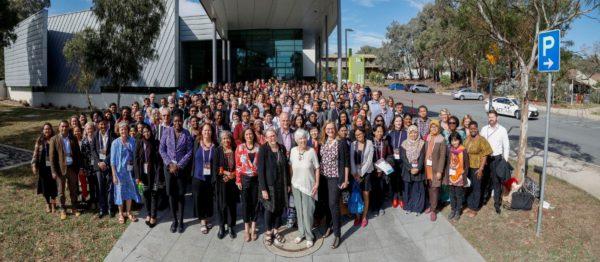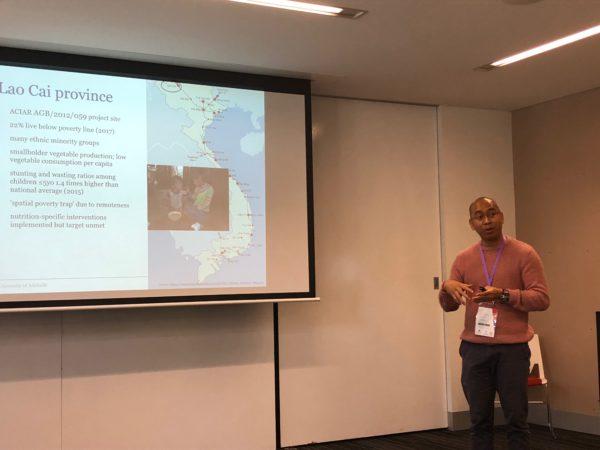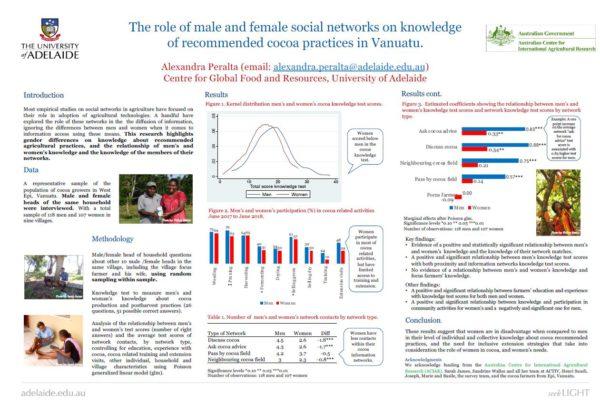Gender researchers unite to implant seeds of change
Blog post prepared by Christian Genova
Last week, I attended the Seeds of Change Conference at the Ann Harding Conference Centre, University of Canberra. It was the first conference that convened 280 academics and researchers from 45 countries who are working primarily on gender-related issues like women’s empowerment, inclusiveness, and gender equality in agriculture. This year’s overall theme was “Gender Equality through Agriculture Research for Development”. Prof. Naila Kabeer from the London School of Economics and Political Science (LSE), Prof. Katherine Gibson from Western Sydney University, Dr. Jane Curnow from the Australian Centre for International Agricultural Research (ACIAR), and Vicki Wilde from the Bill and Melinda Gates Foundation were the invited keynote speakers.

Conference group photo. Photo courtesy:ACIAR
Prof. Kabeer discussed three main points to empower rural women. The first is to distinguish empowerment with economic empowerment. Prof. Kabeer cautioned that economic empowerment is only one of the three pathways to empowerment- with political and cultural empowerment as the other two. The second relates with knowing how agricultural intervention projects succeeded in improving women’s economic capabilities. According to her, one of the reasons why agricultural intervention projects failed in India is that rural extension services, for instance, often bypass women due to perception bias− women are not viewed as real farmers. When projects succeed, it managed to successfully integrate most of the structural constraints that create imbalances in access to resources and women’s agency. Therefore, identifying how it worked could ensure proper replication of these projects in other areas. The third one involves urging researchers to include sexual harassment in the empowerment agenda because it undermines the capabilities of girls and women.
The two speakers from the funding agencies, Dr. Jane Curnow from ACIAR and Vicki Wilde from Bill and Melinda Gates Foundation, focused their keynote speeches on collaboration and inclusiveness, respectively. Dr. Curnow admonished everyone that while gender research provoke fear of “losing resources in a zero-sum competition for dollars”, collaboration is crucial to prepare for the inevitable push back. Ms. Wilde stressed the importance of inclusive agricultural transformation, with emphasis on women’s economic empowerment through market inclusion. She stressed the need for a rigorous compilation of evidence by gender to help smallholder farmers, and women and girls in particular, increase their assets, improve their income and their decision-making abilities over the use of those incomes, and ultimately influence system change.

presented two papers that highlight the use of a modified Abbreviated-Women’s Empowerment in Agriculture Index (A-WEAI) in my PhD research. WEAI is a multi-dimensional tool that assesses the level of empowerment in five domains: (1) decisions about agricultural production; (2) access to and decision-making power about productive resources; (3) control of the use of income; (4) leadership in the community; and (5) time allocation to primary productive and domestic tasks.
The first one was a new paper on “Measuring gender empowerment and its implication on household food security in northern Vietnam” under the Masculinities and Agriculture sub-theme, which I am developing with Prof. Wendy Umberger, Dr. Suzie Newman, and Mia Urbano. This paper aims to assess: (a) the status of food security and gender empowerment among the ethnic minority communities in northwest Vietnam, and (b) the association between disempowerment and household food insecurity, for men and women decision-makers separately.The second paper that I presented was “Smallholder vegetable production, women’s empowerment, and dietary diversity of children and adolescents in northern Vietnam” under the Gender and Nutrition in Vegetable Value Chains sub-theme. It is one of the analytical chapters in my PhD thesis, and is co-authored by Prof. Wendy Umberger, Dr. Suzie Newman, and Dr. Alexandra Peralta. This paper aims to find empirical evidence on the role smallholder vegetable production plays in improving the dietary diversity of children and adolescents, using Lao Cai province, northwest Vietnam as a case study. This work is based on a recently completed project funded by ACIAR and led by Prof. Wendy Umberger, that has helped enhance the profitability and sustainability of smallholder vegetable farmers in North Western Vietnam through improved market engagement and integrated resource and farm management practices. Further details of this project are available here.

Poster presented by Dr. Alexandra Peralta
Dr. Alexandra Peralta presented a poster on ‘role of male and female social networks on knowledge of recommended cocoa practices in Vanuatu’. This work is based on a project funded by ACIAR and led by Dr. Alexandra Peralta, that aims to assess the impact of cocoa interventions in Vanuatu. Further details of this project are available here.
In a nutshell, three things stand out that summarise how gender researchers can sustain the momentum of this conference for me:
- Build a database of the agricultural development projects by gender that identifies the successes and failures of these interventions;
- Focus efforts on achieving gender equality, rather than gender equity; and
- Prepare for the “push back” by working closely with those who are willing to collaborate.
Overall, it was an intellectually stimulating event where you can find a perfect blend of the quantitative and qualitative data collection methodologies, and where gender specialists and researchers take center stage instead of being “marginalised”. Details on the conference program and abstracts of the presenters can be found in this link. I am especially grateful to the Australian Centre for International Agricultural Research (ACIAR) Domestic Scholarship for funding my participation to the conference. This conference was jointly organized by the ACIAR, CGIAR Collaborative Platform for Gender Research, and the University of Canberra.
